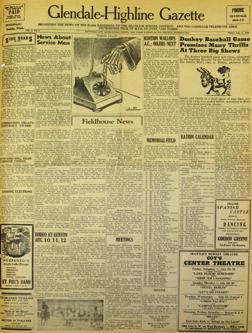Gazette covered local WW II home front
T.C. ROBINSON<br><br>A lot of information was packed on the front page of an early edition of the Glendale-Highline Gazette.
Thu, 08/04/2005
Special to the Times/News
For six decades, the Highline Times has provided the greater Highline area with local community news.
In the beginning, the paper was known as the Glendale-Highline Gazette.
Sixty years ago, most of the world was struggling with the ravages of World War II. City newspapers told the big story of Germany's surrender to allied forces as the Japanese continued to fight; of allied leaders demanding immediate Japanese surrender and B-29 raids.
World tensions built as ideologies between East and West stalemated talks at the Potsdam Conference. Of the "Big Three," only Soviet Premier Josef Stalin was left. President Franklin D. Roosevelt had died in April. Then, in the middle of the conference, Prime Minister Winston Churchill was defeated and replaced by Labour Party leader Clement Attlee.
The Glendale-Highline Gazette reported the human side. Service men from the Highline area told their personal stories. Accounts ranged from the landing at Normandy the previous year, and the subsequent drive to the Elbe River, to the island battles in the Pacific.
On the sports front, Leo Durocher made national news negotiating a contract with the Brooklyn Dodgers for $40,000, but the Gazette reported how the Highline A.C. of the Puget Sound Baseball League were trounced by the Renton-Boeing team 13 to 2.
Even sporting events were tinged with the effects of the war. The A.C. had beaten their next opponents, the Puyallup Valley Oilers, twice that season, but there was concern they "may be without the services of their two Coast Guard aces" in that upcoming game.
Highline baseball's link to the war even had a lighter side. Local teams planned a game of donkey baseball as a fund-raiser for the Highline Service Club. The donkeys to be used were said to be "six of the fastest, funniest and best trained donkeys known to outdoor show business."
Rationing was another sign of the war's effect on the community. A ration calendar gave the specifics on stamps for staples such as meat, butter, and cheese. Gasoline coupons were each good for six gallons.
A hint of the war found its way into local news items, such as the half-completed Memorial Field.
A program for the Highline Kiwanis Club featured "Chinese Post War Reconstruction." Mr. C.T. Rent, program organizer, stressed the significance of this topic since China, an ally, "is surely destined to become one of the world's leading powers."
The Gazette was an important source on local happenings. It chronicled social activities from bowling leagues to craft programs and listed the scheduled meetings of sports and service clubs.
The front-page advertisements give an indication of how Highline citizens relaxed during the war years. The Midway Drive-in boasted a new sound system with individual speakers for each car.
If you weren't interested in movies, you could dance to the big band sounds every Saturday night at the Spanish Castle and at Reeploeg's Angle Lake Plunge on Sunday nights.
The front page of the Glendale-Highline Gazette didn't tell what the world leaders were doing, but it shared-even to this day-how the locals were coping.


